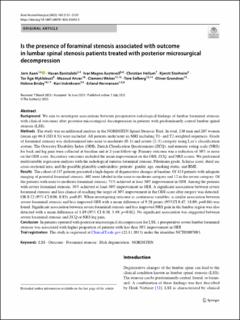Is the presence of foraminal stenosis associated with outcome in lumbar spinal stenosis patients treated with posterior microsurgical decompression
Aaen, Jørn Ståle; BANITALEBI, HASAN; Austevoll, Ivar Magne; Hellum, Christian; Storheim, Kjersti; Myklebust, Tor Åge; Anvar, Masoud D; Weber, Clemens; Solberg, Tore; Grundnes, Oliver; Brisby, Helena; Indrekvam, Kari; Hermansen, Erland
Peer reviewed, Journal article
Published version
Permanent lenke
https://hdl.handle.net/11250/3087294Utgivelsesdato
2023-07Metadata
Vis full innførselSamlinger
Originalversjon
Aaen, J., Banitalebi, H., Austevoll, I.M. et al. (2023) Is the presence of foraminal stenosis associated with outcome in lumbar spinal stenosis patients treated with posterior microsurgical decompression. Acta Neurochirurgica 165, 2121–2129. 10.1007/s00701-023-05693-5Sammendrag
Background
We aim to investigate associations between preoperative radiological findings of lumbar foraminal stenosis with clinical outcomes after posterior microsurgical decompression in patients with predominantly central lumbar spinal stenosis (LSS).
Methods
The study was an additional analysis in the NORDSTEN Spinal Stenosis Trial. In total, 230 men and 207 women (mean age 66.8 (SD 8.3)) were included. All patients underwent an MRI including T1- and T2-weighted sequences. Grade of foraminal stenosis was dichotomized into none to moderate (0–1) and severe (2–3) category using Lee’s classification system. The Oswestry Disability Index (ODI), Zurich Claudication Questionnaire (ZCQ), and numeric rating scale (NRS) for back and leg pain were collected at baseline and at 2-year follow-up. Primary outcome was a reduction of 30% or more on the ODI score. Secondary outcomes included the mean improvement on the ODI, ZCQ, and NRS scores. We performed multivariable regression analyses with the radiological variates foraminal stenosis, Pfirrmann grade, Schizas score, dural sac cross-sectional area, and the possible plausible confounders: patients’ gender, age, smoking status, and BMI.
Results
The cohort of 437 patients presented a high degree of degenerative changes at baseline. Of 414 patients with adequate imaging of potential foraminal stenosis, 402 were labeled in the none to moderate category and 12 in the severe category. Of the patients with none to moderate foraminal stenosis, 71% achieved at least 30% improvement in ODI. Among the patients with severe foraminal stenosis, 36% achieved at least 30% improvement in ODI. A significant association between severe foraminal stenosis and less chance of reaching the target of 30% improvement in the ODI score after surgery was detected: OR 0.22 (95% CI 0.06, 0.83), p=0.03. When investigating outcome as continuous variables, a similar association between severe foraminal stenosis and less improved ODI with a mean difference of 9.28 points (95%CI 0.47, 18.09; p=0.04) was found. Significant association between severe foraminal stenosis and less improved NRS pain in the lumbar region was also detected with a mean difference of 1.89 (95% CI 0.30, 3.49; p=0.02). No significant association was suggested between severe foraminal stenosis and ZCQ or NRS leg pain.
Conclusion
In patients operated with posterior microsurgical decompression for LSS, a preoperative severe lumbar foraminal stenosis was associated with higher proportion of patients with less than 30% improvement in ODI.

